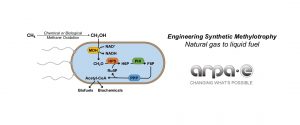
Methylotrophy describes the ability of microorganisms to utilize reduced one carbon compounds, such as methane and methanol, as carbon and energy sources. The recent discovery of large natural gas reserves has prompted considerable interest in utilizing these compounds as substrates or co-substrates with sugars in industrial fermentation of fuels and chemicals, as higher biomass and product yields are expected from these more reduced substrates. Native methylotrophs represent poor industrial microorganisms since many are strict aerobes, produce few metabolites and lack genetic engineering tools. Therefore, the development of synthetic methylotrophy is of considerable interest. Towards this end, our research is focused on engineering Escherichia coli as a platform microorganism for methanol metabolism. Through metabolic and protein engineering techniques, we aim to develop a methylotrophic E. coli strain capable of metabolizing methanol into biomass and valuable chemical products.
Supported by the US DOE ARPA-E agency through contract no. DE-AR0000432.
Antoniewicz, M., Bennett, R. K., Falara, V., Fast, A., Gonzalez, J., Nicolaou, S., Papoutsakis, E. T.,
Selected Publications:
- Sandoval, N. R., Whitaker, W. B. Synthetic methylotrophy to liquid fuels and chemicals. WO2015108777-A1.
- Whitaker WB, Sandoval NR, Bennett RK, Fast AG, Papoutsakis ET. 2015. Synthetic methylotrophy: engineering the production of biofuels and chemicals based on the biology of aerobic methanol utilization. Current Opinion in Biotechnology 33:165-75.